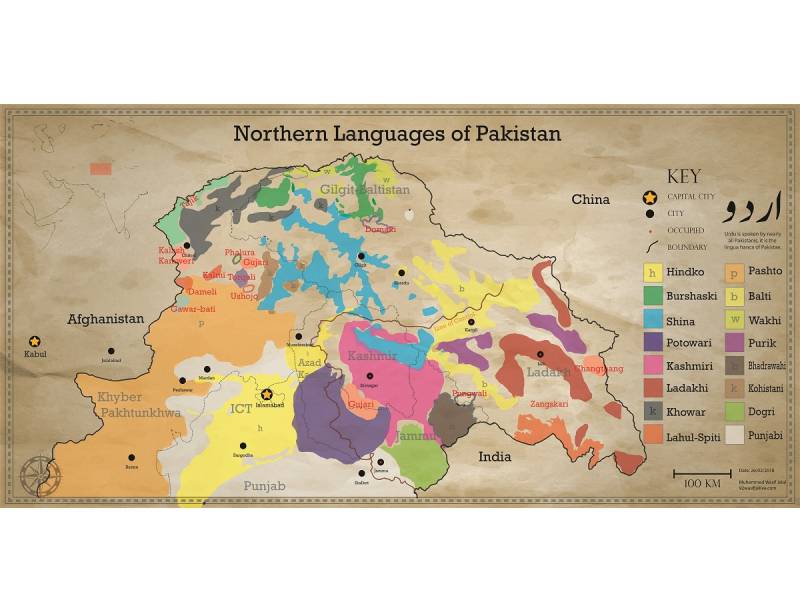
"I love my leader dearly and can never betray him. I will always be with him. A Pathan cannot deceive anyone”.
"Are you a Pathan?"
"Yes"
"No, you are not a Pathan. Look at your language. What are you speaking is no more than nonsense! What a different thing it is! It does not seem to be the language of the Pathans, rather it does not seem to be a language at all. We don't know what noise you are making on the phone.“
"It is my language. What's wrong with it?"
“If it were a language, it would have a writing! It would have a history!"
He is a security guard in a shopping mall in a big city in Pakistan along with other poor men from his own province. When he used to talk to his friends in his village on the phone in the evenings, his fellow watchmen would wonder as to what he was speaking. They were surprised as to what kind of language he speaks and how odd it sounded to them. They would laugh at him and ask about it. When he gave the same name to his language which was given by the forefathers of his co-watchmen, and the name is still commonly used, his fellow watchmen used to mock this poor fellow watchman by assigning very strange and vulgar meaning to this name.
He didn't know what was wrong. He had heard the same name at home and was told by his home that he was a Pathan. The man was surprised and worried. He started worrying. He started talking to his friends and family on the phone in hiding, away from the watchman colleagues. He started staying away from his colleagues. He felt that he was alone in this world. He is a nobody. He has no recognition. He has no history. He has no language at all.
He would often fight with a young man of his village for the sake of his leader because that man did not support his leader. He used to record videos in the washroom abusing his leader's opponents and send these videos to his fellow villager.
After this encounter with his watchman colleagues, he once told this story to his fellow villager. The friend asked him to visit him in the village next time.
When he next came to the village, he contacted this colleague. The colleague said that he worked in a research institute. He mentioned the name of the institute.
The next day, after asking many people, the security guard finally reached the institute, knocked and entered. The same friend was sitting there among books. The security guard asked for books in his language. The friend associated with the institute brought several books and placed them in front of him, in which apart from research books, there were also a large number of school books in his language.
The security guard was immersed in these books. He read several. Then he took 10 of the books and left.
The security guard shouted to his companion. "Look, our language is also the language of books now. It is also a great language. I will go back to the city and teach all these fellow watchmen a lesson."
On reaching the city, he first called his companions and put these books in front of them saying, "Now tell me whether I have a language or not!" Those watchmen were all a bit regretful. He told them that he was not really a Pathan. He has his own history. He had also brought a book written on history. He started teaching these companions. The reading sessions are still going on and all these security guards sit together to read this book in their free time. These colleagues have now got an idea that there also live other people besides themselves in this province. Now they have a good life. They also listen to songs in the language of his non-Pathan companion.
The story is of an ordinary young man from a village. When I narrated this story to other young men in northern Pakistan, every one of them said that the story resonates with their situation as well. They complain of similar treatment by fellows from the dominant and known ethno-linguistic communities in Pakistan.
Human beings are mostly fond of simplicities. They make different categories and classification in order to reduce the burden of complexities of this world. Language is one such factor in social categorisation.
Language is, of course, the most powerful marker of identification and difference, and a more powerful tool of identification than culture. Many studies suggest that people tend to identify more closely with those who share their language than those who share their cultural background. In the story cited above, the watchmen distinguish the colleague because he does not share their language, although there is less visible difference in their cultural backgrounds like dress, physique, religion and social class.
The use of language or dialects by its speakers provides cues that allow others to determine whether the person is a member of an ingroup ('us') or outgroup ('them'). In the story, the colleagues of the watchman determine the membership of the young man, the non-Pathan watchman, from the use of his language and ascribe him to an outgroup.
Language is an integral part of ethnic identity and is indexical to it, that is, it maintains the ‘ethnic boundaries.’ In other words, it contrasts more than any other cultural expression. To elaborate with the above story, the non-Pathan security guard was not differentiated by his colleagues as a member of an ‘outgroup’ unless he began to speak his language, even though he was identifying himself with the same broader ethnic identity that his other watchmen colleagues belonged to. Ethnicity itself is more recognised with the ‘ethnic boundaries’ theory as prompted by the Norwegian anthropologist, social theorist and ethnographer Fredrik Barth.

